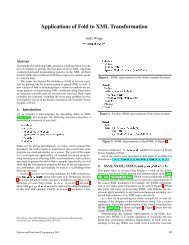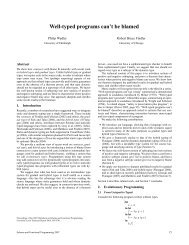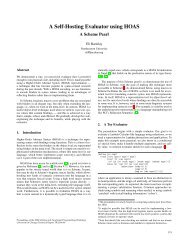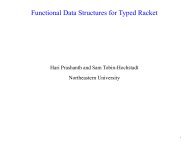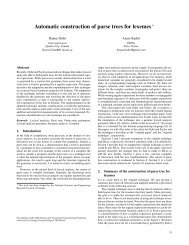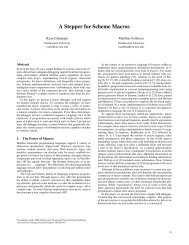2006 Scheme and Functional Programming Papers, University of
2006 Scheme and Functional Programming Papers, University of
2006 Scheme and Functional Programming Papers, University of
You also want an ePaper? Increase the reach of your titles
YUMPU automatically turns print PDFs into web optimized ePapers that Google loves.
(ev* (Q (lambda (x) (+ x 1))))<br />
#<br />
> (ev* (Q ((lambda (x) (+ x 1)) 2)))<br />
3<br />
> (ev* (Q ((lambda (x y) (+ x 1)) 2 (/ 2 0))))<br />
3<br />
> ((ev* (Q (lambda (x) (+ x 1))))<br />
(Q 2))<br />
3<br />
In the last example, the ‘Term→Val’ procedure that is the result<br />
<strong>of</strong> evaluating the first part is directly applied on (Q 2) (a syntax)<br />
which is essentially how the outermost application <strong>of</strong> the second<br />
example is h<strong>and</strong>led. This application jumps back into the evaluator<br />
<strong>and</strong> continues the computation.<br />
Using the <strong>Scheme</strong> toplevel for definitions, we can define <strong>and</strong><br />
use a lazy fixpoint combinator:<br />
> (define Y<br />
(ev* (Q (lambda (f)<br />
((lambda (x) (f (x x)))<br />
(lambda (x) (f (x x))))))))<br />
> (define fact0<br />
(ev* (Q (lambda (fact)<br />
(lambda (n)<br />
(if (zero? n) 1 (* n (fact (- n 1)))))))))<br />
> (ev* (Q (Y fact0)))<br />
#> (ev* (Q ((Y fact0) 30)))<br />
265252859812191058636308480000000<br />
Finally, as an interesting by-product <strong>of</strong> this namespace sharing, we<br />
can even use the call-by-name fixpoint combinator with <strong>Scheme</strong><br />
code, as long as we use ev* to translate the function into a <strong>Scheme</strong><br />
function:<br />
> ((Y (lambda (fact)<br />
(lambda (n)<br />
(let ([fact (ev* fact)])<br />
(if (zero? n) 1 (* n (fact (- n 1))))))))<br />
30)<br />
265252859812191058636308480000000<br />
6. Making ev Self-Hosting<br />
In preparation for making our evaluator self-hosting, we need to<br />
deal with representations <strong>of</strong> all forms that are used in its definition.<br />
Again, to make things simple, we avoid adding new core forms —<br />
instead, we translate the various forms to ones that the evaluator<br />
already knows how to deal with. We will use ‘nested’ instantiations<br />
<strong>of</strong> our evaluator, which will require nested use <strong>of</strong> the Q quotation<br />
form — this is a minor complication that could be solved using<br />
macro-CPS [8, 10], but in Mz<strong>Scheme</strong> [7] it is easier to write a<br />
syntax-case-based macro, which uses a simple loop for nested<br />
occurrences <strong>of</strong> Q. The new (<strong>and</strong> final) definition is in Figure 1. On<br />
first look it seems complex, but it is merely translating additional<br />
forms into known ones, <strong>and</strong> propagates the transformation into the<br />
delay special form (which will be needed shortly).<br />
The lazy evaluator is slightly modified: call-by-name is too slow<br />
to be usable when nesting multiple evaluators, so we change it to<br />
use call-by-need instead. For this, we make it create ev* promises<br />
for function arguments, <strong>and</strong> automatically force promise values<br />
so they are equivalent to plain values. We also need to treat the<br />
term constructor as a primitive (otherwise it will contain promises<br />
instead <strong>of</strong> values). The definition follows.<br />
;; ev* : Term -> Val<br />
;; evaluate an input term into a <strong>Scheme</strong> value, uses call-by-need<br />
(define (ev* expr)<br />
(cond<br />
[(term? expr)<br />
(let ([subs (term-exprs expr)])<br />
(case (term-tag expr)<br />
[(lam) (lambda args<br />
(ev* (apply (car subs)<br />
(map (lambda (a) (delay (ev* a)))<br />
args))))]<br />
[(if) (ev* ((if (ev* (car subs)) cadr caddr) subs))]<br />
[(app) (apply (ev* (car subs)) (cdr subs))]<br />
[else (error ’ev "bad tag")]))]<br />
[(promise? expr) (ev* (force expr))]<br />
[(primitive*? expr)<br />
(lambda args (apply expr (map ev* args)))]<br />
[else expr]))<br />
(define (primitive*? x)<br />
(or (primitive? x) (eq? x term)))<br />
And with this change we are finally ready to run the evaluator code<br />
in itself.<br />
7. Bootstrapping the Evaluator<br />
First, we use the strict evaluator to evaluate a nested copy <strong>of</strong> itself.<br />
In this definition, ev is the same as the strict version above, <strong>and</strong> its<br />
code is used with no change.<br />
(define ev1<br />
(ev* (Q (Y (lambda (ev)<br />
(lambda (expr)<br />
(cond<br />
[(term? expr)<br />
(let ([subs (term-exprs expr)])<br />
(case (term-tag expr)<br />
[(lam) (lambda args<br />
[(if)<br />
(ev (apply (car subs) args)))]<br />
(ev ((if (ev (car subs))<br />
cadr caddr)<br />
subs))]<br />
[(app) (apply (ev (car subs))<br />
(map ev (cdr subs)))]<br />
[else (error ’ev1 "bad tag")]))]<br />
[else expr])))))))<br />
We can verify that this evaluator works as expected:<br />
> (ev (Q (ev1 (Q (+ 1 2)))))<br />
3<br />
> (ev (Q (ev1 (Q ((lambda (x) (+ x 2)) 1)))))<br />
3<br />
We can continue this <strong>and</strong> implement a third evaluator in ev1 —<br />
using the same definition once again. The result is again working<br />
fine.<br />
> (define ev2<br />
(ev (Q (ev1 (Q (lambda (expr)<br />
;; Same code as ev1, substituting ‘ev2’ for ‘ev1’<br />
))))))<br />
> (ev (Q (ev1 (Q (ev2 (Q (+ 1 2)))))))<br />
3<br />
> (ev (Q (ev1 (Q (ev2 (Q ((lambda (x) (+ x 2)) 1)))))))<br />
3<br />
It is interesting to compare the performance <strong>of</strong> the three evaluators.<br />
We do this by defining a Fibonacci function in each <strong>of</strong> the<br />
three levels <strong>and</strong> in <strong>Scheme</strong>:<br />
(define fib<br />
(lambda (n)<br />
(if (




